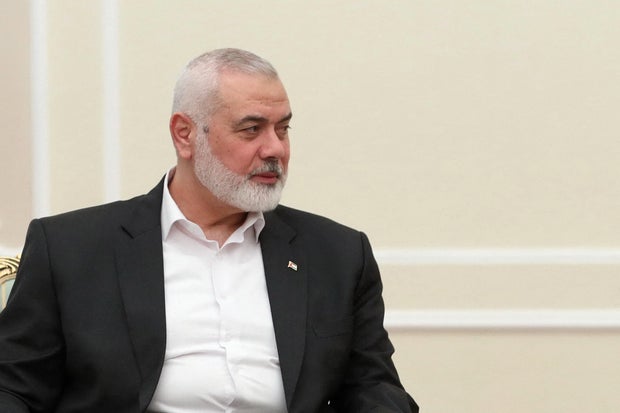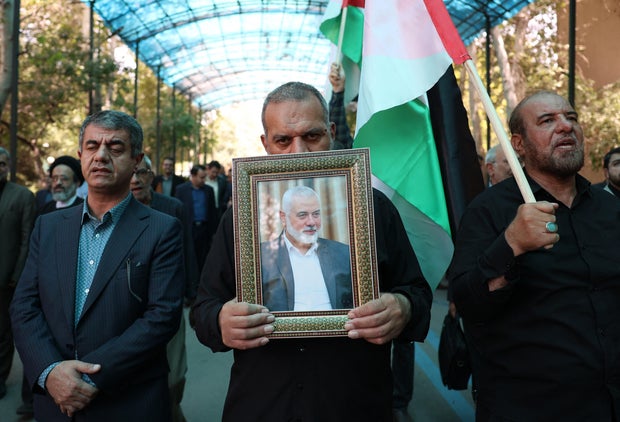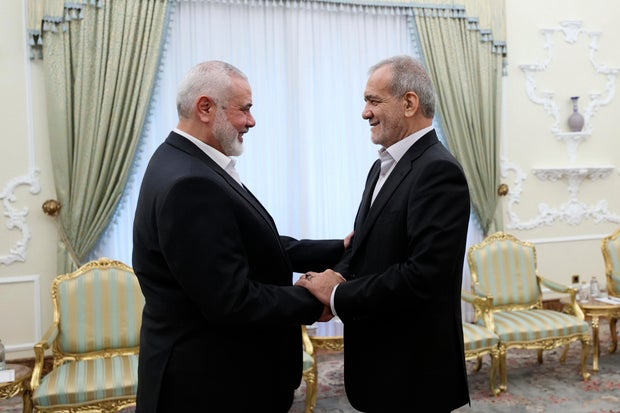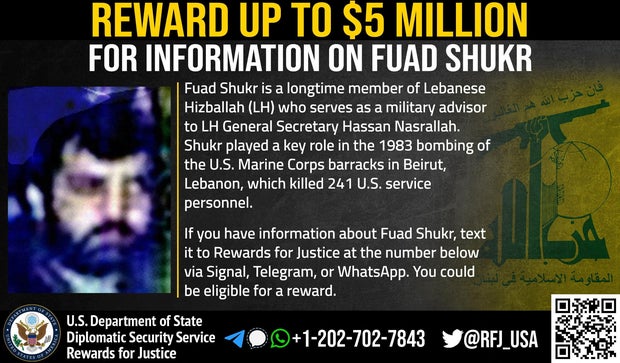Beirut — Hamas leader Ismail Haniyeh was assassinated in Iran’s capital after attending the inauguration of the country’s new president, Iranian officials and the militant group said early Wednesday. Hamas said it was an Israeli airstrike that killed the group’s top political leader.
It was the second Israeli assassination of a senior Iran-allied militant commander in the space of just 12 hours, casting a growing shadow over U.S.-backed efforts to broker a cease-fire in the ongoing Israel-Hamas war and sharply increasing concern that the Gaza war could spread into a wider regional conflict in the Middle East, where the U.S. has thousands of troops based.
Israel did not confirm that it had killed the Hamas chief, but a U.S. official told CBS News’ Margaret Brennan on Wednesday that the U.S. assesses both Haniyeh and top Hezbollah commander Fuad Shukr were killed in Israeli strikes. Shukr was killed Tuesday in a strike in Beirut, Lebanon, which Israel confirmed it had carried out.
Iran’s Supreme Leader Ayatollah Ali Khamenei vowed that Iran would take revenge on Israel for Haniyeh’s killing.
“With this action, the criminal and terrorist Zionist regime prepared the ground for harsh punishment for itself, and we consider it our duty to seek revenge for his blood as he was martyred in the territory of the Islamic Republic of Iran,” Khamenei said in remarks carried by the country’s state media.
Israel had vowed to kill Haniyeh and other senior Hamas figures over the group’s Oct. 7 terrorist attack on Israel, which saw the militants kill some 1,200 people and take about 240 others hostage. The attack sparked the war in Gaza, a densely populated Palestinian territory run for almost two decades by Hamas, which has long been designated a terrorist organization by Israel and the U.S.
Health officials in the Hamas-run enclave, who do not distinguish between civilian and combatant deaths, say the war has killed almost 40,000 Palestinians.
Qatar says assassinations “undermine the chances of peace”
Haniyeh’s death, hours after Israel said it had assassinated Shukr, a senior commander of the larger Iran-backed militant group Hezbollah, was likely to complicate efforts by the U.S. to negotiate a cease-fire in the Gaza war.
The government of Qatar, which has been a key partner in the talks aimed at a cease-fire and hostage release agreement, warned Wednesday that the killing of Haniyeh would “lead the region into chaos and undermine the chances of peace.”
A source with knowledge of the ongoing cease-fire talks told CBS News on Wednesday that Haniyeh’s assassination could complicate the mediation efforts as he was “a key decision maker” in the negotiations.
“He was someone who saw the value of a deal and was instrumental to getting certain breakthroughs in the talks,” the source told CBS News. “At this stage, it’s unclear what the effect will be on cease-fire talks.”
“How can mediation succeed when one party assassinates the negotiator on other side?” Qatar’s Prime Minister Mohammed bin Abdulrahman bin Jassim Al Thani, who is also the country’s foreign minister, asked in a post on social media, condemning “political assassinations.”
“Peace needs serious partners & a global stance against the disregard for human life,” Al Thani said.
An Israeli military spokesman didn’t immediately respond to a request for comment. Israel often doesn’t comment on assassinations carried out by its Mossad intelligence agency.
Asked if he could confirm that Israel was behind the strike that killed Haniyeh, U.S. Defense Secretary Lloyd Austin told reporters during a visit to the Philippines on Wednesday: “I don’t have anything for you on that.”
Austin told reporters he didn’t think a wider war in the Middle East was inevitable following the killings, adding that Washington was working to cool the rising tension in the region.
Speaking during a visit to the Philippines, U.S. Secretary of State Antony Blinken said he was aware of the reports of Haniyeh’s killing and he stressed the importance of “getting a cease-fire… in the interest of putting things on a better path.” He said he wouldn’t speculate about any impact on those efforts from the assassinations.
Israel accused of assassinations in Tehran and Beirut
Hamas said Haniyeh was killed “in a Zionist airstrike on his residence in Tehran” after he attended the swearing-in of Iran’s new President Masoud Pezeshkian on Tuesday, along with other Hamas officials and officials from Hezbollah and allied groups.
“Hamas declares to the great Palestinian people and the people of the Arab and Islamic nations and all the free people of the world, brother leader Ismail Ismail Haniyeh a martyr,” the group said in its terse statement.
Iran’s state-controlled media quoted Pezeshkian as saying Iran would “defend its territorial integrity, dignity, honor, and pride, and will make the terrorist occupiers regret their cowardly act,” the Reuters news agency reported.
Haniyeh hadn’t been in Gaza in years and spent most of his time in Qatar, where Hamas has its primary political office outside of Gaza.
Some of Hamas’ most senior leaders are still believed to be in Gaza and remain on Israel’s wanted list. Topping that list is Yahya Sinwar, Hamas’ top leader in the Gaza Strip, who masterminded the Oct. 7 attack.
In the West Bank, the internationally backed leader of the Palestinian Authority, President Mahmoud Abbas, condemned Haniyeh’s killing, calling it a “cowardly act and dangerous development.” Political factions in the Israeli-occupied territory called for strikes to protest the killing.
In April, an Israeli airstrike in Gaza killed three of Haniyeh’s sons and four of his grandchildren.
In an interview with the Al Jazeera satellite channel at the time, Haniyeh said the killings wouldn’t pressure Hamas into softening its positions amid the cease-fire negotiations with Israel.
The killing of Haniyeh came hours after Israel carried out the rare strike on Beirut that it said had killed Shukr, a top Hezbollah military commander who was also wanted by the U.S. for his role in a deadly 1983 attack on a U.S. Marine base in the Lebanese capital.
The Tuesday strike in Beirut also killed at least one woman and two children, and wounded dozens of people.
Hezbollah said Wednesday that it was still searching for Shukr’s body.
Hezbollah said Haniyeh’s death would make the region’s resistance more determined in facing Israel, according to Reuters.
The strike came amid escalating hostilities between Israel and Hezbollah, which is based in Lebanon, across Israel’s northern border.
Meanwhile, Iraq’s Popular Mobilization Forces, a coalition of Iranian-backed militias, said a strike Tuesday night on a base southwest of Baghdad killed four members of the Kataib Hezbollah militia.
The group accused the United States of being behind the strike. Kataib Hezbollah, along with some of the other militias, has in recent months carried out attacks against bases housing U.S. troops in Iraq and Syria in retaliation for Washington’s support for Israel in the war in Gaza. Those strikes had eased, but they’ve stepped up again in recent weeks.
A U.S. military official told CBS News on Tuesday that American forces in Iraq had “conducted a defensive airstrike” on militants south of Baghdad who were “attempting to launch one-way attack” drone, which the U.S. forces believed, “based on recent attacks in Iraq and Syria,” posed a threat to American and allied troops in the region.
“This action underscores the United States’ commitment to the safety and security of our personnel. We maintain the inherent right to self-defense and will not hesitate to take appropriate action,” the official said.
China and Russia condemn killing of Haniyeh
Russia slammed Haniyeh’s killing, calling it an “unacceptable political assassination,” AFP said.
China condemned the Haniyeh “assassination” and voiced concern it could result in further instability in the region, Reuters reported.
CIA Director Bill Burns was in Rome on Sunday to meet with senior Israel, Qatari and Egyptian officials in the latest round of talks. Separately, Brett McGurk, the White House Coordinator for the Middle East and North Africa, is in the region for talks with U.S. partners.
Israel is suspected of running a yearslong assassination campaign targeting Iranian nuclear scientists and others associated with its atomic program. In 2020, a top Iranian military nuclear scientist, Mohsen Fakhrizadeh, was killed by a remote-controlled machine gun while traveling in a car outside Tehran.
In Israel’s war against Hamas since the October attack, more than 39,360 Palestinians have been killed and more than 90,900 wounded, according to the Hamas-run Gaza Health Ministry, whose count doesn’t distinguish between civilians and combatants.




